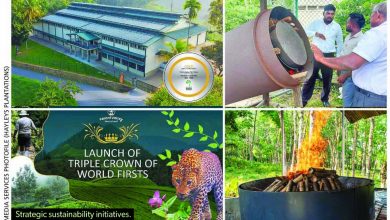The world celebrates International Day of Women and Girls in Science on 11 February. And Director – Technology Innovation at Twinery, Innovations by MAS Sithila Dassanayake, says that this celebration is not only the right thing to do socially but also the most effective thing to do from a global standpoint, since not empowering half the world’s population results in the human race losing out on half its potential.
EMPOWERING THE OTHER HALF
Sithila Dassanayake highlights the need to engage more women and girls in STEM to make the world a more productive place
She explains: “Including women and girls in science, technology, engineering and mathematics (STEM) is beneficial financially and from a productivity perspective to any community, company or country.” She adds that it’s “not a MeToo movement that will die down because it has a much bigger, holistic purpose.”
Dassanayake notes: “There are many researchers around the world who attest that having more women on company boards increases profitability. Yet, women shouldn’t be part of a quota or checkbox activity. Having gender balance in boards, universities and elsewhere ensures that diversity (different ideas, skills and perspectives) is brought to the table so that there is richness in decisions.”
She explains: “Although girls are on par or better than boys in all school subjects and there is no systematic advantage in the education curriculum for boys, around the age of 14-15, there is a tendency for girls to pick non-STEM subjects due to stereotyping and other social biases.”
This trend is seen in tertiary education too, where although more girls enroll at universities, only a few pick engineering, ICT or other STEM subjects with the exception of medical and material sciences.

Director – Technology Innovation
at Twinery, Innovations by MAS
Dassanayake recommends five key changes that need to be in place to engage more girls in STEM: parental attitude that encourages children to be whatever they want to be; learning material beginning with story books and textbooks that don’t build stereotypes in children from a young age; introducing role models in a manner that doesn’t portray gender as a differentiator; engaging girls and boys in extracurricular activities without gender-based preferences; and encouraging partnerships between academia and corporates to make them aware of the opportunities available in STEM regardless of gender.
She also implores corporates to let go of assumptions and preconceived notions about women where they are considered unable to balance work with family life, and not able to fit into certain job roles. And instead, Dassanayake wants women to be allowed to be their own decision makers when it comes to career advancement.
“Women have much more capacity than people imagine,” she avers, and invites organisations to enable women to unleash their potential through simple and practical initiatives. She adds: “Provide women help with childcare. This will be a game changer since it will encourage women to return from maternity leave without feeling that they may fall behind.”
Dassanayake advises working women to not worry about ambitiousness being considered unfeminine: “If you like it and want it, don’t worry, go for it – there is nothing you can’t do.”
She calls on the need for women to have confidence in themselves, and the right conversations with others regarding their ambitions and capabilities. Dassanayake stresses that “as women we shouldn’t assume things that limit us – be it spouses, colleagues, bosses or families, or feel like victims; we should speak up and go for what we want.”
– Compiled by Ruwandi Perera
“As women we shouldn’t assume things that limit us – be it spouses, colleagues, bosses or families, or feel like victims; we should speak up and go for what we want”
INSPIRING YOUNG MINDS
Twinery, Innovations by MAS is driven to raise awareness of STEM-related career opportunities for young girls. The company’s ‘Girls in STEM’ programme has, to date, covered 70 girls in seven schools, and introduced them to topics such as innovation, entrepreneurship, aviation, conservation, femtech, wearable technology and motorsports. The students were also brought in for an experiential day at Twinery to experience the technology the company has developed. This was followed by a panel discussion with four of Twinery’s own women in STEM and moderated by the students themselves. The schools were then invited to host their own experiential and knowledge sharing days, and the students shared their learnings with younger children through various activities including quizzes and presentations about STEM. Twinery, Innovations by MAS will be conducting similar programmes for suburban schools in the future to empower young people to aspire for STEM-related careers.
Even internally, Twinery, Innovations by MAS upholds people’s merits above all else. Speaking about the company’s recruitment policy, Dassanayake says: “When screening applications, we view them fairly without any discrimination. We simply go by the person’s merit since that is all that matters.” Flexibility is also interwoven into the fabric of the firm with novel practices such as remote working opportunities for all employees in addition to wellbeing-related policies that help balance family priorities and career goals.
Email hello@twinery.co | Website www.twinery.co








